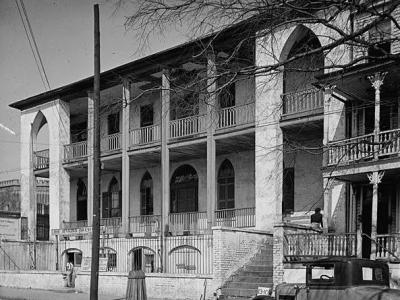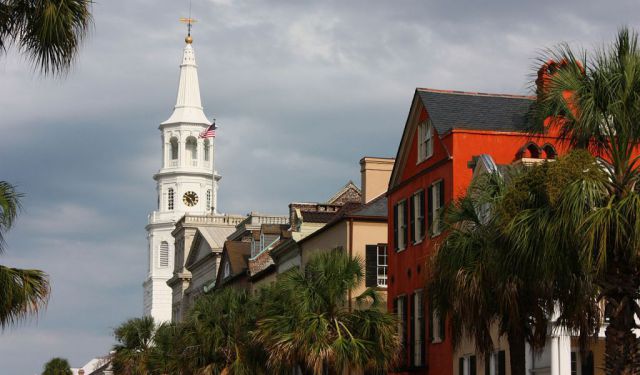Old Marine Hospital, Charleston
Designated as a National Historic Landmark, the Old Marine Hospital stands as a testament to the architectural prowess of Robert Mills, a Charleston native often hailed as the first professionally trained American architect. Known for his work on iconic structures like the Washington Monument and numerous public buildings across the nation, Mills also played a role in the development of a standardized design pattern for marine hospitals, using the one in Charleston as a model. Remarkably, out of approximately 30 marine hospitals constructed before the Civil War, only eight have survived to this day.
During its construction, the Old Marine Hospital became a focal point of controversy in Charleston's antebellum era. It was perceived by proponents of states' rights as a symbol of the Federal government's overreach, as funding for the hospital was deducted from sailors' wages and supplemented by taxes imposed on the shipping industry. This intervention sparked resentment among many Charlestonians, who were already frustrated with the heavy-handed involvement of the Feds. The appointment of Mills and other professionals from Washington D.C. to oversee the project, along with increased costs, further fueled resentment among supporters of states' rights. By the time the structure was completed in 1834, it was largely rejected by the local community as an unworthy civic achievement.
Despite the controversy, Mills created a building of exquisite charm and refinement. The building's subtle Gothic elements, such as pointed arches, windows, and clustered columns, evoke the aesthetics of medieval religious architecture; even the delicate porch railings were designed to mimic the tracery found around Gothic stained glass windows. The use of piazzas, a common feature in Charleston's domestic architecture, served both practical and climatic purposes, offering protection from the elements.
Following the Civil War, the building was repurposed as a free school for black children by the Episcopal Church. From 1895 to 1939, it served as the Jenkins Orphanage, known for its renowned band that embarked on fundraising tours across the United States and Europe. In 1939, the Housing Authority of Charleston acquired the building for administrative offices, a role it continues to fulfill to this day.
During its construction, the Old Marine Hospital became a focal point of controversy in Charleston's antebellum era. It was perceived by proponents of states' rights as a symbol of the Federal government's overreach, as funding for the hospital was deducted from sailors' wages and supplemented by taxes imposed on the shipping industry. This intervention sparked resentment among many Charlestonians, who were already frustrated with the heavy-handed involvement of the Feds. The appointment of Mills and other professionals from Washington D.C. to oversee the project, along with increased costs, further fueled resentment among supporters of states' rights. By the time the structure was completed in 1834, it was largely rejected by the local community as an unworthy civic achievement.
Despite the controversy, Mills created a building of exquisite charm and refinement. The building's subtle Gothic elements, such as pointed arches, windows, and clustered columns, evoke the aesthetics of medieval religious architecture; even the delicate porch railings were designed to mimic the tracery found around Gothic stained glass windows. The use of piazzas, a common feature in Charleston's domestic architecture, served both practical and climatic purposes, offering protection from the elements.
Following the Civil War, the building was repurposed as a free school for black children by the Episcopal Church. From 1895 to 1939, it served as the Jenkins Orphanage, known for its renowned band that embarked on fundraising tours across the United States and Europe. In 1939, the Housing Authority of Charleston acquired the building for administrative offices, a role it continues to fulfill to this day.
Want to visit this sight? Check out these Self-Guided Walking Tours in Charleston. Alternatively, you can download the mobile app "GPSmyCity: Walks in 1K+ Cities" from Apple App Store or Google Play Store. The app turns your mobile device to a personal tour guide and it works offline, so no data plan is needed when traveling abroad.
Old Marine Hospital on Map
Sight Name: Old Marine Hospital
Sight Location: Charleston, USA (See walking tours in Charleston)
Sight Type: Attraction/Landmark
Guide(s) Containing This Sight:
Sight Location: Charleston, USA (See walking tours in Charleston)
Sight Type: Attraction/Landmark
Guide(s) Containing This Sight:
Walking Tours in Charleston, South Carolina
Create Your Own Walk in Charleston
Creating your own self-guided walk in Charleston is easy and fun. Choose the city attractions that you want to see and a walk route map will be created just for you. You can even set your hotel as the start point of the walk.
Historical Houses Tour
Charleston is steeped in history. Walking the colorful, narrow cobblestone streets of one of America's oldest towns, with its stunningly preserved colonial homes, you can see its story play out before your eyes practically everywhere you turn. Indeed, Charleston is among the most celebrated places in the U.S. to explore fine examples of American architecture and its progression through time.
... view more
Tour Duration: 2 Hour(s)
Travel Distance: 4.3 Km or 2.7 Miles
... view more
Tour Duration: 2 Hour(s)
Travel Distance: 4.3 Km or 2.7 Miles
Downtown Historical Churches Tour
Charleston, South Carolina, is also sometimes called the “Holy City.” This is due to the large number of churches found here. Needless to say, the most fascinating of them are concentrated in the Downtown area, each with its unique charm and significance.
Among such temples of distinction is Saint Matthew's Church, an enduring symbol of Charleston's German Lutheran community. Its... view more
Tour Duration: 1 Hour(s)
Travel Distance: 1.3 Km or 0.8 Miles
Among such temples of distinction is Saint Matthew's Church, an enduring symbol of Charleston's German Lutheran community. Its... view more
Tour Duration: 1 Hour(s)
Travel Distance: 1.3 Km or 0.8 Miles
French Quarter Walking Tour
A historic district in downtown Charleston, The French Quarter is named so for the high concentration of French merchants that once lived in the area and left their mark on it. The name was coined in 1973, when preservation efforts began for warehouse buildings on the Lodge Alley block. That same year the district was added to the National Register of Historic Places.
The busy neighbourhood... view more
Tour Duration: 1 Hour(s)
Travel Distance: 1.7 Km or 1.1 Miles
The busy neighbourhood... view more
Tour Duration: 1 Hour(s)
Travel Distance: 1.7 Km or 1.1 Miles
Harleston Village Walking Tour
Founded in the 18th century, the historic Harleston Village is a charming neighborhood in Charleston, South Carolina. The rich past and vibrant present of this area make it a popular destination for tourists.
At the heart of Harleston Village lies the College of Charleston, an esteemed institution of higher learning, established in 1770, adding a great deal of academic flair to the... view more
Tour Duration: 2 Hour(s)
Travel Distance: 2.3 Km or 1.4 Miles
At the heart of Harleston Village lies the College of Charleston, an esteemed institution of higher learning, established in 1770, adding a great deal of academic flair to the... view more
Tour Duration: 2 Hour(s)
Travel Distance: 2.3 Km or 1.4 Miles
Charleston Introduction Walking Tour
A popular tourist destination and a major port city in South Carolina, Charleston is fit to impress anyone with its Southern charm, friendliness, and rich history. Founded in 1670 as Charles Town, honoring King Charles II of England, this was the first comprehensively planned town in America.
The city's significance in American history is tied to its role as a key slave trading port. The... view more
Tour Duration: 2 Hour(s)
Travel Distance: 2.8 Km or 1.7 Miles
The city's significance in American history is tied to its role as a key slave trading port. The... view more
Tour Duration: 2 Hour(s)
Travel Distance: 2.8 Km or 1.7 Miles








